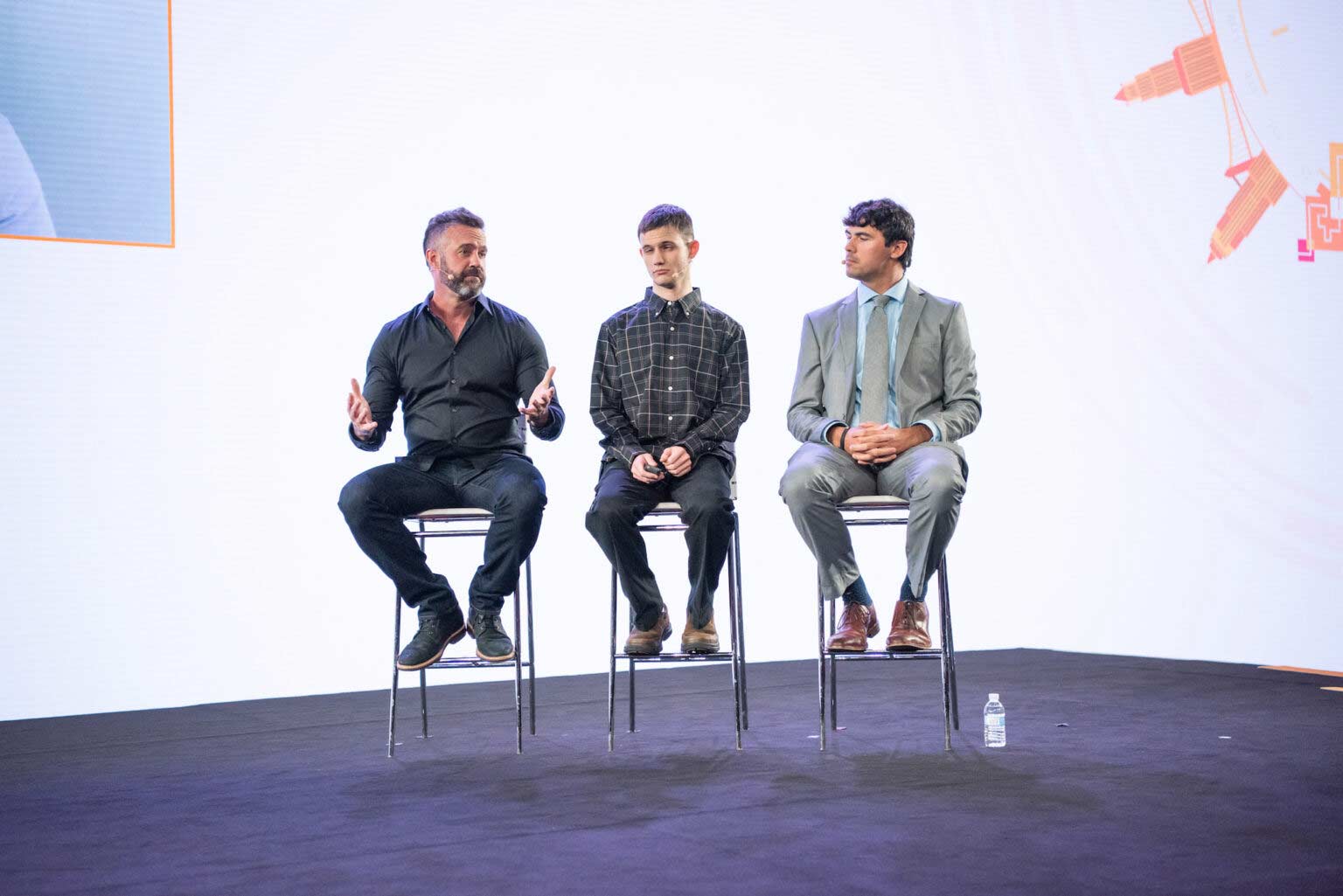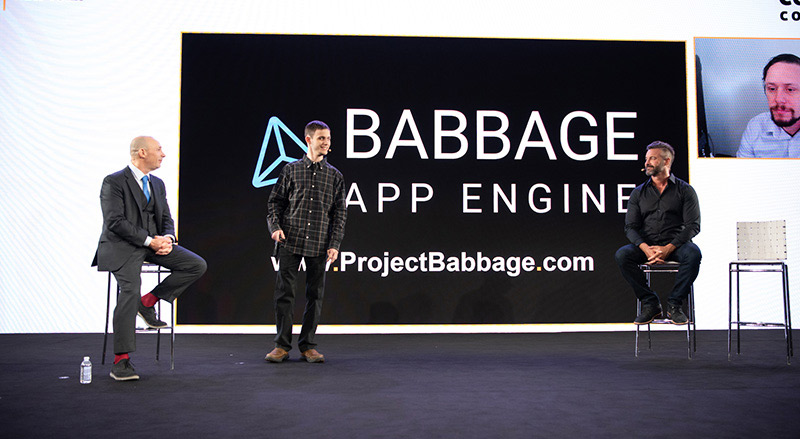Most people are resigned to the pervasive data economy model of the Internet – that which commodifies and sells the personal data of its users to advertisers, upending social structures and responsible discourse in the process. Ty Everett is not one of those people.
As he explained in his captivating presentation at CoinGeek New York 2021, users of Internet-based services have lost more than their rights and privacy by signing away their identity and data to platforms like Facebook and Twitter – they’ve been stripped of their responsibility.
Everett is the Founding President of Project Babbage, a collated set of standards that defines a new way for Internet services to give sovereignty and responsibility back to their users. Named after Charles Babbage, the creator of the first mechanical computer, Project Babbage uses the power of the BSV blockchain to lay the foundation for a new, better Internet built around the concept of a blockchain-based Metanet.
Being partially blind and dependent on certain aspects of technology to interact with the world, Everett is acutely aware of the role the Internet plays in social hierarchies and the danger of the current ‘data economy’ model used by the social media platforms that dominate our interactions.
Everett was born with a condition that severely inhibits his vision and his ability to recognise objects. From the moment he was provided with a braille-based computer at six years old, funded by the Sparrow Club, Everett has experimented with technology, computing and programming.
As accessibility technology improved, Everett was able to use devices like the Apple iPad and MacBook Pro, which expanded his ability to learn new programming languages and interact with modern development resources. Technology’s ability to improve accessibility has also greatly enhanced his ability to interact with the world – a fact demonstrated by his presentation at CoinGeek New York, which was the furthest he had ever travelled unaided.
Bitcoin Association spoke to Everett to find out more about the Project Babbage initiative and his insights into the way Internet-based services interact with our lives.
Braille computer to BSV
Everett’s first exposure to computing was at six or seven years old, when he was given a $5,000 BrailleNote MPower BT computer boasting 128MB of flash storage – an amount he notes was sufficient considering there was no need to store images or video on the device. Everett immediately began to push the limits of the machine, though, by copying and pasting lines of text until the braille-based computer’s memory became overloaded.
‘I think that what it taught me is that when the computer does something wrong, it’s not because the computer has messed up, it’s because the humans have messed up. And right now, the computers in our world are not doing anything wrong, they’re just doing what we’ve told them,’ Everett says.
This machine was formative in nurturing his love of automation and computer science, and he continued to use it for eight years, after which he migrated to standard, modern devices that offered numerous accessibility features.
Using zoom, voiceover and other functions offered by the improving technology at his fingertips, Everett was able to experiment with development in a variety of programming languages. He was also able to engage more easily in online discourse and research, and in 2016 he discovered the Bitcoin protocol.
Everett began his blockchain journey by contributing to the Bitcoin Cash community in 2017, building tools and resources on top of the protocol in addition to various applications. These included a small social network platform and a few payment projects. As the BSV blockchain split from Bitcoin Cash, he followed many developers to the BSV protocol due to its technical superiority and capabilities.
He notes that his progression to the BSV blockchain was natural, as its underlying protocol has proven capable of realising his vision for Project Babbage, which he created in 2020 to enable people to leverage the full potential of Bitcoin and what it has to offer.
‘I really haven’t looked back because it’s never failed me and this space has grown in line with the way that I want to grow and what I want my project to be. So, that’s why I’m here and I don’t plan on leaving,’ he says.

Rebuilding the Internet
Project Babbage is the embodiment of Everett’s perspective on modern Internet services, which he has refined over years of research and experience interacting with platforms that sell user data to advertisers and are designed to distort social hierarchies. When asked about the current ‘data economy’ created by Silicon Valley social media companies, he denounces the underlying business model as manipulative.
‘I think it’s completely perverse and completely antithetical to the ideas of capitalism itself. I mean, they are not taking money in exchange for the value they are providing to people – they are taking people and serving them up to advertisers who can then manipulate them into whatever kind of a belief system would be most convenient for them,’ Everett says.
‘In the past 10 years, there’s been a fundamental thing which has changed, and that is the mechanism by which we primarily communicate and form social structures is now the digital and not the physical. And a lot of our evolved mechanisms for deciding what is reputable and who is most valuable have been turned off, distorted or ignored altogether by these platforms.’
The task of rebuilding the Internet is what Everett has taken on with Project Babbage. The reinjection of reputation and responsibility into online interaction is a key pillar of his vision for the project.
‘What we need to do fundamentally is rebuild the entire Internet in a way that works better for people by giving them more control over what they create and by also allowing them to build a reputation,’ he explains.
‘We need to give people the freedom to express what they’ve done and what they’ve said in good ways, but also, we need to give them the freedom to mess up a little bit and to make decisions which they can learn from, and have people hold them accountable for the decisions they’ve made, because that’s how it works in the real world.’
While Project Babbage addresses the problems of data sovereignty and personal privacy within incumbent systems, Everett stresses that responsibility and accountability play a crucial role in the creation of a better Internet; if digital interactions could manifest the same weight of responsibility and accountability as those of physical social actions, then online discourse could be improved by the commensurate addition of consequences.
‘Everyone goes on about all of these rights and all of these things that we have around, you know, we should have the right to privacy, we should have the right to all of these things. But one of the things that Project Babbage also does is it gives you responsibility – and responsibility is very important, because without it you really don’t have anything to value in terms of what you might have the rights to. And so, in addition to giving people rights and these abilities to protect their information and own their identities, part of ownership is being accountable and having responsibility for things,’ Everett says.
‘By giving people the ability to own the things they create and the actions they take, we will allow them to better ascribe reputation to one another.’
The creation of a new, better Internet built on the accountability provided by the BSV blockchain is a central goal of the Metanet – both a defined protocol and a concept that describes a second-layer network of communication and interaction running on BSV. Project Babbage does not use the technical Metanet protocol as defined by nChain, but through its own compatible technical implementation, it aims to accomplish the same goal – the creation of a new Internet that offers far more value and sovereignty to its users.
‘If we insist on making the digital the primary mechanism by which humans organise themselves then what we need to do is replace the fundamentally bad conductor of value that is the Internet with a fundamentally better conductor of value that is the Metanet,’ Everett says.
‘That would enable reputation to be preserved, that would enable identity to be controlled and held by users, and it would enable the actions taken by users to be attributable to them and not to the platforms on which those actions were taken.’
How Project Babbage works
Project Babbage currently comprises several different software offerings: a user-facing component called Babbage Desktop, a set of developer tools which includes the Bridgeport tool and a Nanostore verifiable storage tool for multimedia applications. The desktop software is currently in a pre-alpha phase, with a pre-alpha preview of Bridgeport released in November.
Babbage Desktop aims to be the portal to the Metanet of applications and services built on the Project Babbage platform and BSV blockchain. It will offer a user experience very different from the current Internet, which will be immediately apparent to users by the integration of a single blockchain-secured identity – removing the need for separate passwords and accounts for each service.
Actions taken within services built on Project Babbage will also be translatable and written on-chain, removing the data siloes present in current Internet services and forcing services to compete on user experience rather than locking users into a specific platform. There will be no advertising; users will pay nanopayments for each action they complete on the platform and will have complete sovereignty over their personal data and identity.
This business model for the new Internet restores control to the users of services instead of those services and their advertisers, and the payment of tiny transactions for each action is something which can only be accomplished using the infinite scalability and nanopayment features of the BSV blockchain – one of the many reasons Everett has chosen BSV as the foundation for his vision.
‘Project Babbage is a new system for creating apps on the Internet with better incentives. We have a way for users to own the identities and the actions which they take, so that no matter which apps they’re using, they can receive the best experiences based on their past actions,’ he says.
‘So, app developers facilitate the users in taking actions and those users then have those actions registered on the blockchain so that the developers are able to then take the actions from the chain and reinterpret them in different and competing ways to represent their user experience.’
‘That enables developers to have new business models based around things like micropayments which enable content creators to earn revenue from users directly, without needing to go through content platforms like how they do right now with Instagram and YouTube.’
Project Babbage is still in the early stages of development, and Everett says he is currently searching for and encouraging developers to build on the platform. Once useful applications have been created, onboarding users will be a natural process of these services’ adoption. There are several developer tools available, the most important of which is Bridgeport, which will allow developers to easily integrate the reading and writing of actions from the blockchain into their applications.
‘I want to make it so that as many developers as possible can create technologies and applications and services using this new model, because the more developers that create using this model, the more valuable every application and platform that operates in this way is going to be – including my own,’ Everett says.
To get involved with building on Project Babbage, developers can go to the project’s official website and follow the provided tutorials to create applications using the Babbage SDK, Nanostore and Bridgeport. Everett has also created YouTube videos which describe the development process for Project Babbage applications and expand on the technical aspects of his vision.
